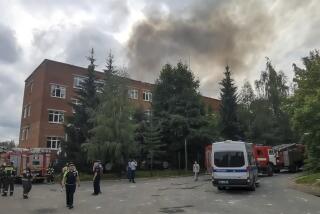Nuclear Disaster in Soviet Union
Chernobyl, where the Soviet nuclear accident occurred, is not far from the Ukrainian city of Kiev.
Chernigov, where I was born and lived for the first nine years of my life, is also not far from Kiev. When I became aware of the potentially deadly effects from the radioactive cloud released by the accident, my first reaction was: There but for the grace of God go I. But upon further reflection I found myself thinking less about my own good fortune than about the future of my children--and their children.
To a large extent the shift in focus resulted from an almost eerie convergence of news reports and articles dealing with other accidents as well as the one at Chernobyl.
On May 1, for example, The Times reported as follows: âFearing another Chernobyl or Bhopal disaster, hundreds of panicky Indians fled an explosion and fire at a trouble-plagued Indian Atomic Energy Commission plant.â
At about the same time, the recent Challenger space shuttle tragedy was being recalled to memory in a vivid manner by reports that the recently recovered remains of the seven crew members had been flown from Kennedy Space Center to various parts of the country for burial in family funeral services.
A few days earlier, The Times, referring to the April 18 explosion of a Titan rocket at Vandenberg Air Force Base, quoted one of the space programâs pioneers as saying: âItâs amazing it (the explosion) took so long to happen.â And a mechanical engineering expert added: âThese systems are really complex, and a lot of things can go wrong. Weâve really been riding a lucky streak, and it may be coming home to roost.â
The complexities of the Titan rocket system, the Challenger space shuttle, Chernobyl, Three Mile Island and all the rest cannot be denied. But they are as simple as childâs play compared to the truly awesome complexities of the so-called Strategic Defense Initiative (âStar Warsâ), in which a vast number of components would have to be combined into an integrated system so reliable that it would operate flawlessly the first time it would ever be put to use.
More awesome than all the other aspects of complexity would be the need to design the computer links required for Star Wars to function as a whole. Convinced of the impossibility of ever designing the necessary computer network, Dr. David Parnas, a leading expert and consultant to the Office of Naval Research, recently resigned from the official SDI panel that deals with computer-related aspects of the project.
The connection between the recent spate of technological mishaps and Star Wars--a connection no news reports or commentaries have touched upon to my knowledge--is one that should not be ignored. Referring to the accidental destruction of a Delta rocket recently, a highly placed White House official told a television reporter that this, and all the other recent accidents, were like a âslumpâ in which a baseball or basketball team finds itself temporarily, and from which it eventually recovers if it has the right stuff.
It is true, of course, that recovery from the limited damage (and loss of life) suffered in the Chernobyl and Challenger misfortunes does take place, and remedies can be sought to prevent recurrence of the particular problems that caused destruction of the Titan and Delta rocket systems. But given what we now know about the potentially terminal consequences of a âNuclear Winter,â can we realistically expect ârecoveryâ from a technological failure in a space-based hodgepodge so multifarious and complex that most independent scientists (those who are unlikely to, or have no wish to, earn salaries or fees from the Star War money pot) see it as yet another spur to a nuclear arms race neither side can win, but both can lose?
I wonder whether recent reminders of technological vulnerability and their connection to Star Wars occurred to President Reagan when he was asked if the Delta rocket accident might imply reason for concern about our security--and replied: âNoâ and added that it was only the 12th time the Delta had failed in 178 launchings. I wonder whether he realizes that while these can be remedied, prevention is the only remedy for a Star Wars accident.
HAROLD WILLENS
Los Angeles
More to Read
Sign up for Essential California
The most important California stories and recommendations in your inbox every morning.
You may occasionally receive promotional content from the Los Angeles Times.










